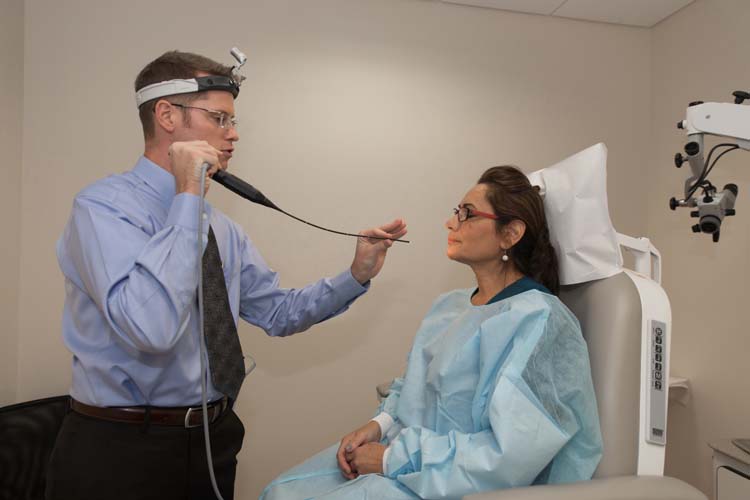Say the word “cancer” and the first medical specialties most people think about are “oncology” or “radiology” or maybe even “hematology.”
It’s probably a safe bet that “otolaryngology” wouldn’t make anyone’s top 10 list.
Maybe that’s because “oh-toe-lair-in-goll-oh-jee” is just so darned tough to pronounce.
Still, when it comes to spotting cancers caused by the sexually transmitted human papilloma virus or HPV, Dr. Seth Tudor says he and his fellow ENT (ears, nose and throat) physicians – as otolaryngologists are more commonly called – are uniquely qualified to identify and help treat “oropharyngeal squamous cell carcinomas” or the head and neck cancers that HPV can trigger.
“The oropharynx,” explains the tall, youthful-looking Tudor, “is one of the areas of the throat that involves the tonsils, the soft palette, the base of the tongue, and the pharynx, or the back of the throat” and that’s where many HPV-induced cancers hide.
The Johns Hopkins School of Medicine says “HPV now causes most of the oropharyngeal cancers in the U.S.” and points out that “more than 20 million Americans have some type of genital or oral HPV infection.”
Additionally, the National Institutes of Health claims, “the incidence of oropharyngeal squamous cell carcinoma is rising,” and goes on to report it is now the sixth most common cancer in the world with 630,000 new cases being diagnosed each year resulting in 350,000 deaths annually.
The reason doctors like Tudor are seeing so many HPV-related cancers is fairly obvious – people enjoy sex.
As Tudor explains, “HPV is most commonly transmitted through intimate contact. That is something that is very common. And there are hundreds of HPV strains and something like 80 to 90 percent of people who had three or more sexual partners have been infected with one strain [or another] and you would frequently never know.”
The National Cancer Institute says HPVs “are a group of more than 200 related viruses” and that more than 40 of those viruses can be easily spread through direct sexual contact” including vaginal, oral and anal sex.
The good news? There are effective HPV vaccines available.
The bad news? Many parents are loath to have their pre-teen children vaccinated for HPV, at an age when the vaccine could be most helpful.
Tudor is sympathetic to parents’ dilemma. “Some people have this idea that if you vaccinate kids for an STD it somehow encourages them to engage in sexual behavior.”
But he also points out, “the whole point of asking parents to vaccinate their [pre-teen] children is because it’s well before they’re even thinking about sex. That’s the way this vaccine works. You get vaccinated before you’re exposed to an HPV infection. That’s the point. You get the vaccine well before you’re going to have sex.”
The Centers for Disease Control recommends 9-to-12-year-olds get two doses of HPV vaccine six months apart to protect against the cancers caused by HPV
And then there are misconceptions which include a ‘boy versus girl’ kind of pretzel logic.
Most parents, Tudor explains, “are well aware of the link between HPV and cervical cancer” but they sometimes think that’s something their male child doesn’t have to worry about.
Indeed, Tudor has heard some parents say, “Well, I have a boy. Why do I need to get a vaccine for my son?” But Tudor responds by saying, “There are several reasons why your son should get vaccinated. Just because he can’t get cervical cancer doesn’t mean he can’t get one of the other types of cancer,” including cancer of the penis.
Moreover, getting vaccinated will help prevent him from spreading any of the many HPV viruses out there to any future partner or partners.
Given the demographics of this area, it’s far too late for most people here to seek out an HPV vaccine.
Children, however, can live their lives knowing they are immune from at least some forms of cancer and, as a result, can avoid some of the downright gruesome outcomes Tudor has seen.
“I’ve seen this sort of cancer [in patients] as young as a 29-year-old guy who had a horrible tumor in the back of his tongue that was HPV-related,” adding, “I’ve seen plenty of 30- and 40-year-old men who also have had it.”
Tudor would like to help the next generation avoid all of that and he is eager to explain how.
Dr. T. Seth Tudor’s office is at 12920 U.S. 1. Suite B in Sebastian. The phone number is 772-228-9808.

